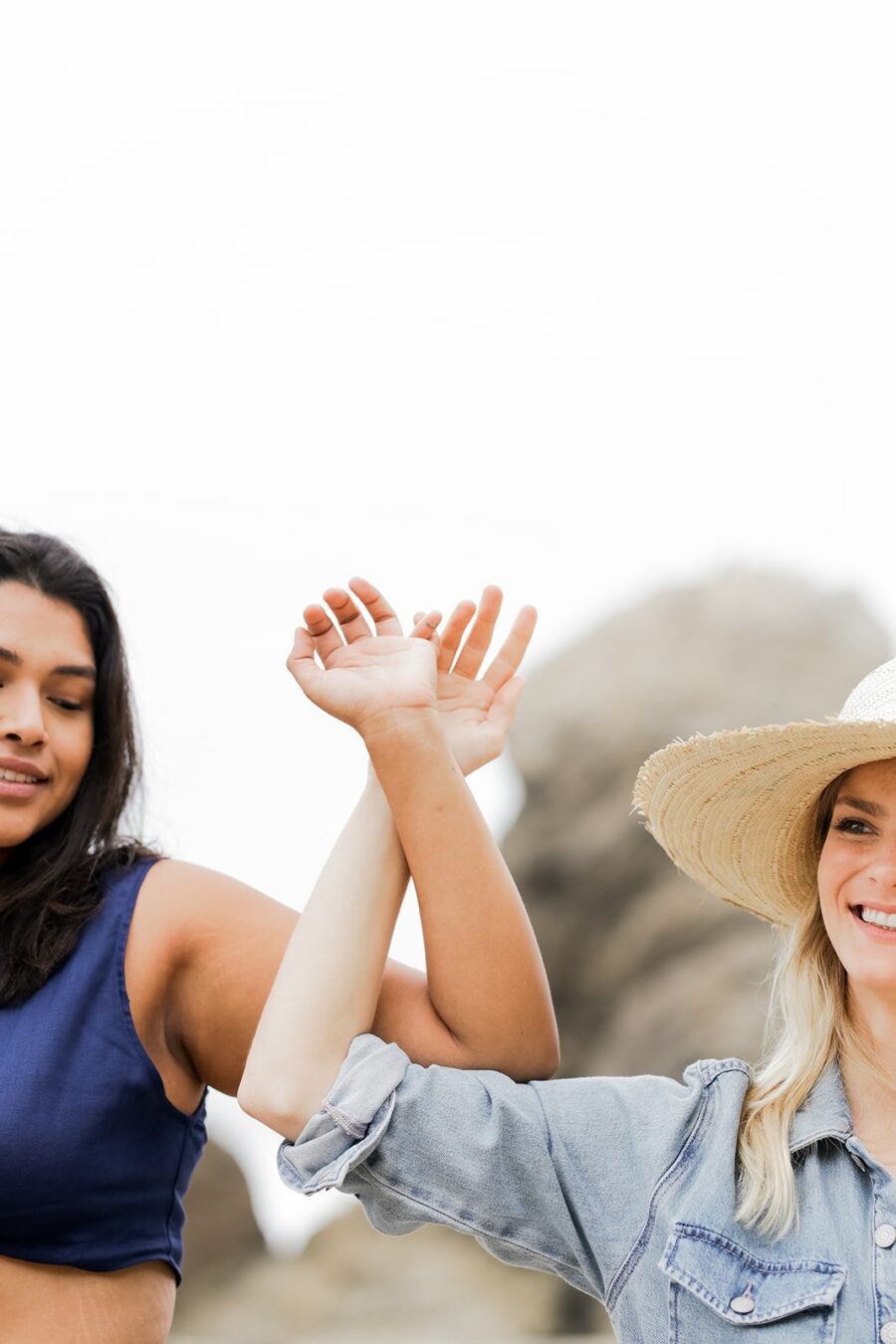
7 Ways To Share Your Sustainable Lifestyle With Your Partner
A Low-Plastic Partnership
I’ll just say it: zero-waste living feels more difficult to achieve when there’s two of you. Twice the shopping, twice the transportation, twice the single-use plastic waste 😱 Add in pets, and it’s a whole new ball game.
It also means that you have to endure a lot more compromises when you’re not on the exact same page as your partner. Maybe you’ve moved easily towards using concentrates for cleaning to reduce plastic bottle waste, but haven’t yet made the leap to switch from single-use floss picks to something slightly more sustainable (yes, this is exactly my situation).
“I believe that sustainable living, like minimalism, ethical shopping, and intentional living, is a lifestyle change that is best approached with moderation and patience.”
There is the upside of having another set of hands to help with DIY projects and farmer’s market hauls, and there’s one more mouth to help you eat every last bit of food you make. However, the discussion about moving towards a more sustainable and low-plastic lifestyle involves more than just a few handy swaps: it calls for major upheaval of long-engrained routines.
I believe that sustainable living, like minimalism, ethical shopping, and intentional living, is a lifestyle change that is best approached with moderation and patience. Telling someone to simply “quit making waste” feels unapproachable and intimidating. Instead, I’m pitching that you start with baby steps if getting your partner on board with a low-waste life is important to you.
Here are the steps I’m secretly (and not-so-secretly) taking with my spouse so we can reduce our reliance on single-use plastic, and hopefully reduce our overall carbon footprint. (These tips, with some little adjustments, also work for roommates or bffs if you’re not romantically entangled at the moment!)
1. Talk it out.
Start by talking about why it’s important to you—make sure the conversation stays relaxed, positive, and aspirational, avoiding any judgment or criticism. Explaining why you’re excited about it and outlining what you want to get out of a more sustainable lifestyle is a lot more tangible than just saying “we should try to be less wasteful.”
“Talk about why it’s important to you—make sure the conversation stays relaxed, positive, and aspirational, avoiding any judgment or criticism.”
This is also a good time to establish expectations. No need to set them high to start with—a zero-waste lifestyle doesn’t happen overnight. Instead, make plans like eliminating plastic produce bags for at least one grocery trip each week or taking one haul to the recycling center each month. Plus, simple goals like this help ease into the larger things if you or your partner are just getting started.
2. Create simple systems.
Which brings us to the next point: build in simple ways to succeed. Whether you do this together or on your own, replace routine steps with more sustainable options. For example, if you want to ditch single-use cups and utensils, slip a to-go mug and some silverware into you and your partner’s lunch bags each morning. Or, stow half a dozen reusable grocery bags in your car so you’ll always have them even if you forget (if you’re anything like me, you already have too many tote bags in your house, anyway. Attention everyone: please stop with the free tote bags.)
If it’s time to ditch plastic wrap or foil, add some beeswax wrap or glass tupperware into your budget for the month; make space for it, even if it means you’re the only one taking the first steps. The implementation comes easier once the tools are in place.
3. Lead by example.
You’re not going to wake up to the perfect sustainability partner one day out of the blue. You won’t even wake up as the perfect sustainability partner on most days, so lead by example and just do the best you can.
“It’s a real relationship-saver when you skip the nagging and opt to go about your own business in the most sustainable way you know.”
Prioritize packing your lunch over take-out, bring reusable produce bags for your veggies, take shorter showers (or shower together to save water 😳)—if you’ve talked the talk, it’s time to walk the walk. Plus, it’s a real relationship-saver when you skip the nagging and opt to go about your own business in the most sustainable way you know. Trust me.
4. Turn it into a date.
Make sustainability sexy and add a little eco-friendly flair to your next date night. Obvious choices might include DIY days where you make your own homemade soaps, candles, or other home essentials (even meal prep to avoid future food waste). Or, if you need home supplies, clothing, or gifts, head out for a day of thrifting and vintage shopping; discovering strange thrift-shop treasures together always makes for an interesting adventure.
More creative dates might include volunteering at the community garden (or renting out a plot of your own for a full summer of date ideas) or beach cleanups. Maybe you walk instead of driving or ride-sharing to your next day at the local brewery; whatever you do, keep an open mind about small swaps you might be able to make to reduce your carbon footprint.
5. Make it a gifting opportunity.
I mean, who doesn’t like getting presents? I know I do 🙋 Maybe you gift your partner a zero-waste shaving set, or all-natural self-care products like shampoo bars and bath salts in glass jars. A bento box for lunches, a tumbler in their favorite color, or homemade soup or baking mixes they can whip up in a hurry.
The key here is making sure it’s something they’re interested in adding to their routine. If you try to force it, you may end up with a gift that goes unused and some (potentially) hurt feelings for both of you.
6. Know that it’s not all on you.
“Spend an afternoon practicing empathy and kindness, and (bonus!) you’ll feel those ripple into your relationship.”
If there’s one thing I’ve learned from the sustainability space, it’s that small individual changes must be accompanied by immense structural, governmental, and corporate changes. I love a baby step, but it’s essential that we recognize these steps are not available for everyone. Let’s start by cranking down the interpersonal judgment around waste and no-waste habits, and then stand up for global change.
So in the spirit of actual community, partner up and head to community events, cleanups, or call your local and state representatives about the issues that matter most to you. Volunteer if you can, where you can—this world needs more help than just with the plastic problem. Spend an afternoon practicing empathy and kindness, and (bonus!) you’ll feel those ripple into your relationship.
7. Leave room for error.
Most of all, be nice. Don’t expect zero waste habits to form instantly, and allow some space for alternatives. I’m not about to throw a fit if my husband comes home with plastic produce bags, especially on the days where my rabbits don’t have a single spinach leaf left to eat. Or if he gifts me a plastic-heavy gift, I greet it with gratitude and grace; there’s enough nitpicking and negativity, so I just work on giving the plastic that comes into my home the longest lifespan possible. (Okay but really that 100-pack of gel pens makes my life better every day.)
And I’m certainly not perfect; my beauty shelves are full of plastic bottles, I use paper towels freely as napkins, and hardly purchase anything organic. I go through regular tubes of toothpaste like it’s my job, and I love a good two-day delivery from the online-retailer-that-shall-not-be-named. It’s always, always, a process, so you might as well invite your partner (or bff) along for the triumphs and failures—because together is always better.
What are your favorite sustainable practices to engage in with your partner?
RELATED READING
Emily Torres is the Managing Editor at The Good Trade. She’s a Los Angeles transplant who was born and raised in Indiana, where she studied Creative Writing and Business at Indiana University. You can usually find her reading or writing, caring for her rabbits, or practicing at the yoga studio. Say hi on Instagram!

